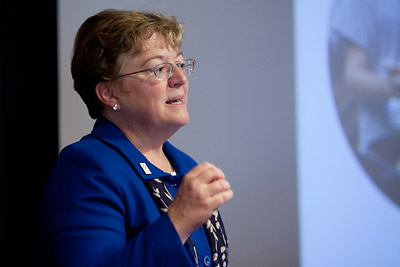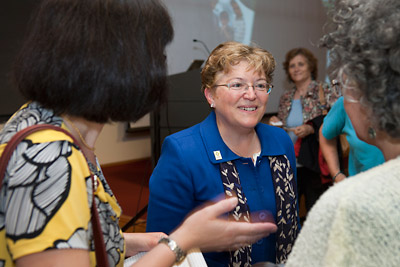Extension addresses 'society's most pressing problems,' says Dean Boor
By Bethany Liebig


The "One Great Idea" that launched the Cornell Cooperative Extension (CCE) system 100 years ago was visionary at the time, remains visionary today, but must be supported so it can continue to deliver its vision well into the future, said Kathryn Boor, the Ronald P. Lynch Dean of Agriculture and Life Sciences, addressing about 100 people June 28 in the Biotechnology Building.
Boor's lecture focused on the importance of science in everyday life and CCE's role in engaging people of all ages in its application.
"When science is applied to the situations that we encounter in everyday life, we have a framework from which to make observations and to implement changes that ultimately will lead to novel solutions to improve human lives," Boor said. "When we are engaged as a society in the application of scientifically derived knowledge, the benefit is magnified.
"Extension provides the entry point to allow citizens to contribute directly to discovery," she added, citing examples from a diverse set of CCE programs, from gardening workshops and Marcellus Shale seminars to brown marmorated stink bug collections.
The lecture, which was streamed live on the Internet and in CCE offices across the state, was the first in a series sponsored by CCE to celebrate its centennial. Other lectures are planned for the fall, on campus and in New York City, featuring Alan Mathios, dean of the College of Human Ecology, and Randy Woodsen, chancellor of North Carolina State University.
Reflecting on CCE's shared history with CALS, Boor quoted the college's first dean, Liberty Hyde Bailey, who in 1911 spoke on the topic of sustainability, and she told the story of the state's first extension agent, John Barron, a 1906 CALS grad. Barron was quick to embrace new tools and technologies to educate and engage his audiences, and his modern-day equivalents continue to find novel ways to do the same, Boor said.
Likewise, CALS continues to align its priorities with a focus on addressing emerging real-world problems within the framework of sustainability, and it counts on extension agents to implement and inform its research, she said.
"The opportunities are immense," Boor added. "By working hand-in-hand with scientists in Cornell labs and side-by-side with New York residents in communities across the state, Cornell Cooperative Extension will deliver solutions to society's most pressing problems well into the future."
Boor also called for greater investment in science and agriculture to ensure that we are able to meet the needs of a growing global population without compromising the ability of future generations to meet their own needs.
She acknowledged that agricultural research and development are expensive and that it can take several years before the full impact of such research is realized, but she noted that the benefits can be measured in real dollars -- a University of California-Davis study, for example, reported that every dollar spent on public agricultural research and extension returns $32 to society.
"I make this plea at a time when public investments in agricultural research are declining at all levels," Boor said. "But to approach the sweeping, transformational changes essential to truly sustainable food and agricultural systems, we must reinvest in publicly funded agricultural research and reorient the national research portfolio to include consideration of sustainability issues."
Bethany Liebig is a writer intern in the College of Agriculture and Life Sciences.
Media Contact
Get Cornell news delivered right to your inbox.
Subscribe